Are you considering opening a bank account for your child? With many options available, you might be wondering which one you should choose.
The best bank accounts for kids have reasonable (or zero) fees, are easy for kids to use and offer parental control features.
Here’s a list of the top bank accounts for kids.
Top Checking Accounts for Kids
In alphabetical order, here are some checking accounts you may want to consider as you get ready to help your child improve their financial savviness.
1. Alliant Credit Union Teen Checking Account
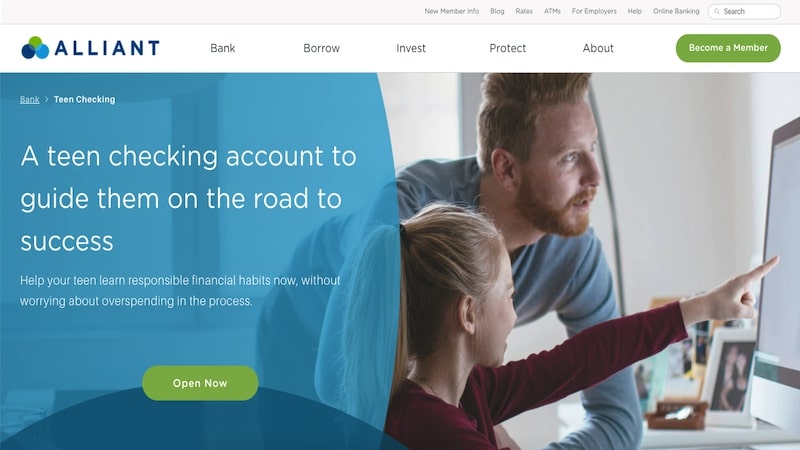
The Alliant Credit Union Teen Checking Account is available for teens when you own or open an Alliant Credit Union checking account.
Here are some of the account’s requirements and fees:
- Age requirement: 13 to 17
- Monthly fee: $0
- Monthly minimum balance: $0
- ATM fee: 80,000 fee-free ATMs, $20 per month in fee reimbursements
- Debit card: Contactless Visa debit card
Alliant’s Teen Checking account comes with a variety of parental controls, including activity alerts and daily spending limits.
This account must have a parent account owner as a joint owner and will convert to the Alliant Checking Account once your teen turns 18.
The Alliant Teen Checking account pays interest provided you receive e-statements and have at least one direct deposit per month.
Best for: Parents looking for an interest-bearing account for their teen
Pros
- Pays interest
- No monthly fee
- No minimum balance
Cons
- Parents must have a seperate Alliant checking account
2. Axos Bank First Checking
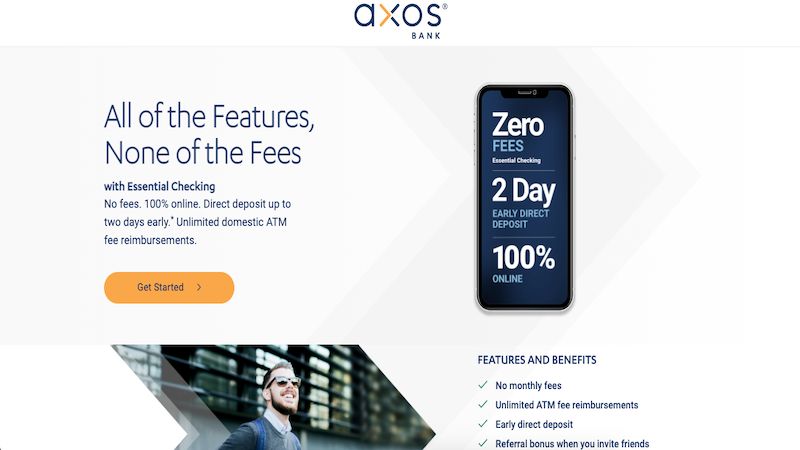
Axos Bank’s First Checking is a joint account for teens and a parent or legal guardian. This account has a variety of features that are attractive to teens, including peer-to-peer payment capabilities.
These are the requirements and fees you can expect with this account:
- Age requirement: 13 to 17
- Monthly fee: $0
- Monthly minimum balance: $0
- ATM fee: Free at over 91,000 in-network ATMs, $12 per month in fee reimbursements
- Debit card: Contactless Visa debit card
You won’t pay any overdraft or insufficient funds fees with this account.
In addition, you can use biometric identification with Axos, get activity alerts and deactivate or reactivate your teen’s debit card from your account dashboard.
Daily limits of $100 for ATM and $500 for debit card spending apply, and this account earns interest on balances.
Best for: Parents who want to limit daily spending
Pros
- Interest-earning account
- Peer-to-peer payments
- Biometric identification features
Cons
- Smaller daily limits for ATM and debit usage
3. Capital One MONEY Teen Checking Account
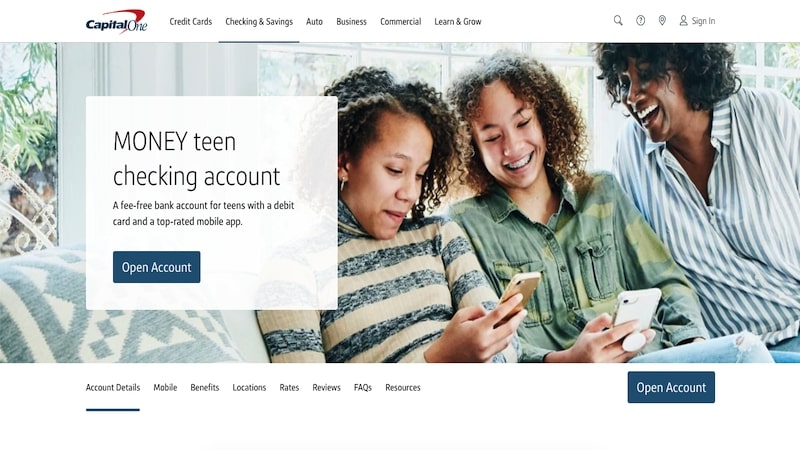
Capital One’s MONEY Teen Checking account is a top-rated account with a highly ranked app for both teens and parents.
Unlike many other teen checking accounts, Capital One lets members as young as eight apply to be joint members on the MONEY account.
This account has the following requirements and fees:
- Age requirement: Eight to 17
- Monthly fee: $0
- Monthly minimum balance: $0
- ATM fee: Free at over 70,000 in-network ATMs
- Debit card: Free Mastercard debit card included
Other features include the ability to set up parental notifications and an option to apply for overdraft protection. This account offers one of the best debit cards for kids.
As a parent, you can open your own Capital One checking account for transferring funds to the MONEY teen account. Alternately, you can transfer money from another banking institution.
This account does pay interest. Furthermore, there are $500 daily limits on ATM withdrawals, non-PIN debit charges and PIN transactions.
Best for: Parents who want to transfer money from a bank other than Capital One
Pros
- Higher daily spending limits
- Interest-earning
- No separate parent account required
Cons
- No ATM fee reimbursements
4. Chase First Banking
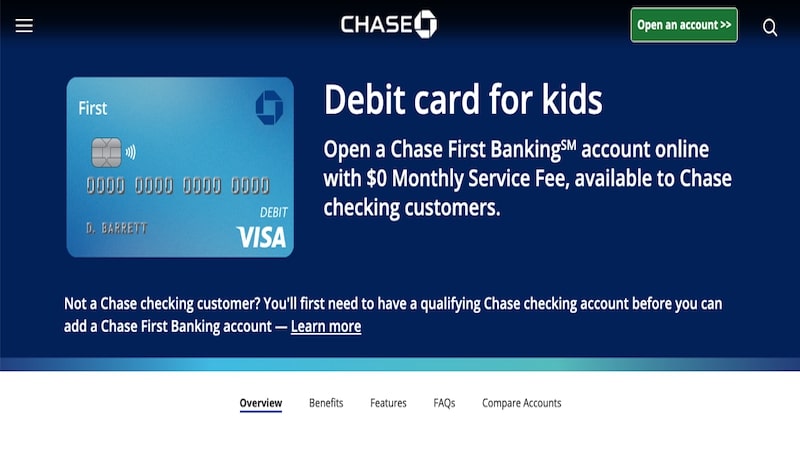
The Chase First Banking account is available exclusively to current or new Chase checking customers.
This account is somewhat similar to the Greenlight debit card for kids. Kids can use their Chase First Banking account to spend, save and earn money.
Better yet, your child gets a debit card that gives you complete control over their spending limits. You can even specify spending limits down to a specific category.
You can expect the following requirements with this account:
- Age requirement: 6 to 17
- Monthly fee: $0
- Monthly minimum balance: $0
- ATM fee: Free at over 16,000 Chase ATMs
- Debit card: Free debit card included
As a parent, you can use the app to assign chores and pay your child when their tasks are completed.
Additionally, your child can set savings goals and transfer money to and from those goals whenever they want.
Best for: Parents who are searching for an account with a chore/earn feature
Read our full Chase First Banking review for more details.
Pros
- Chore app included
- Savings goals available
- For kids as young as six years of age
Cons
- Limited network of free ATMs
5. Chase High School Checking
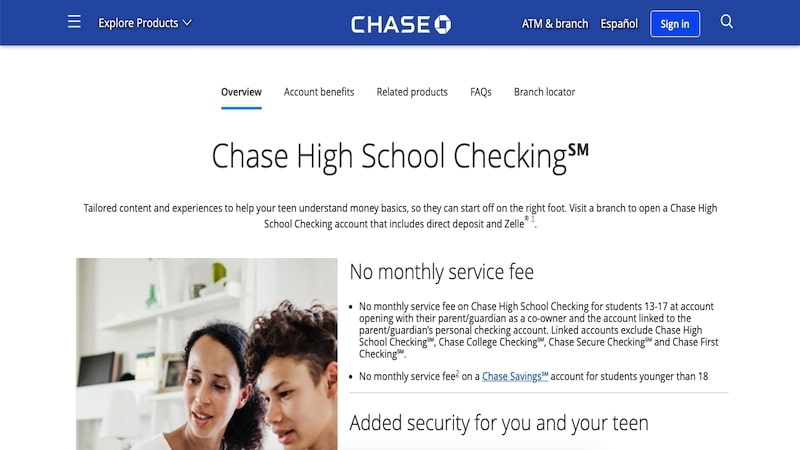
The Chase High School Checking account is the next step up when you’re ready to move on from the Chase First Checking account.
This account works nicely with Zelle for transferring money.
As with Chase’s First Checking account, parents must have a Chase Checking account of their own in order to open a high school checking account with Chase.
These are the requirements and fees for this account:
- Age requirement: 13 to 17
- Monthly fee: $0
- Monthly minimum balance: $0
- ATM fee: Free at over 16,000 Chase ATMs
- Debit card: Free debit card included
Parents can also use Chase’s mobile app to track their teen’s spending activity.
This account allows for a bit more freedom than the Chase First checking while still giving you parental control features.
Best for: Parents who want a companion savings account and savings goal feature for their teen
Pros
- Integrated with Zelle
- Savings goals features
- Fee-free savings account
6. Copper Banking

Copper Banking is a fintech company that was built with teens in mind. As a parent, you can set up an automated allowance to your teen’s Copper account.
Your teen’s direct deposit can be sent to Copper as well, and it will arrive up to two days early.
The Copper Banking account has the following requirements and fees:
- Age requirement: 13 to 17
- Monthly fee: $0
- Monthly minimum balance: $0
- ATM fee: Free at over 55,000 Allpoint ATMs
- Debit card: Free debit card included
This account requires a $10 minimum opening requirement.
Both your teen and their friends get a $3 bonus when your teen refers their friend to open a Copper account with their referral link.
There’s a learning center on the Copper website that you can use to teach your kids about money management.
It’s important to note that both parents and teens need to have a cell phone in order to open a Copper account.
Best for: Teens who want to make a little extra money with a referral program
Pros
- Comprehensive learning center
- Solid referral program
Cons
- Teens must have their own cell phone in order to participate
7. Wells Fargo Clear Access Banking

The Wells Fargo Clear Access Banking account is a practical account that works for you as a sole owner or as a joint owner with your teen.
This account doesn’t come with checks, so it’s difficult to overdraw the account. In addition, the $5 monthly service fee is waived when the primary owner is between the ages of 13 and 24.
These are the requirements and fees to use this account:
- Age requirement: 13 to 24
- Monthly fee: $0
- Monthly minimum balance: $0
- ATM fee: Free at over 12,000 Wells Fargo ATMs
- Debit card: Free contactless debit card included
There is a $25 minimum opening deposit requirement, and the account can integrate with Zelle.
You can sign up for activity alerts to help monitor your teen’s spending and keep an eye out for fraudulent activity.
Best for: Parents who bank at Wells Fargo or want a bank with brick-and-mortar locations
Pros
- Free account up until age 24 to get your kid through college
- Zelle integrated
Cons
- Limited free ATMs
- Higher minimum account opening balance
Top Savings Accounts for Kids
It’s also important to evaluate savings accounts for kids. These accounts are meant for amassing money.
Here are some of the top savings accounts for kids, in alphabetical order.
8. Alliant Credit Union Kids Savings Account
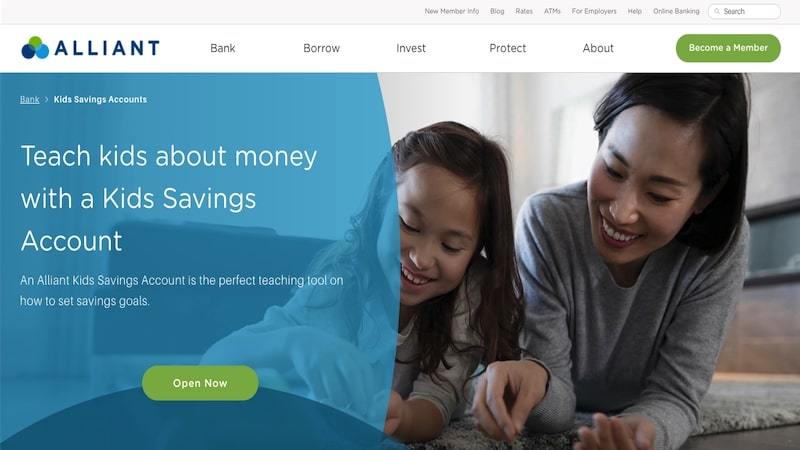
If you have kids who are too young to open an Alliant Credit Union Teen checking account, the Alliant Kids Savings account might be the perfect solution.
This account is meant for kids 12 and under. Alliant will pay the initial $5 deposit it takes to get started.
Additionally, the account pays interest at around 11x higher than the national average on balances above $100. That means this account can give your kids an incentive to save more money.
Any parent, grandparent or guardian who is (or becomes) an Alliant Credit Union member can open a kid’s savings account with Alliant.
There are no monthly fees associated with this account when you choose to receive e-statements.
Best for: Parents with younger kids who are not ready to have a debit card but want to get started learning money management
Pros
- Interest-bearing account with a higher average yield
- Alliant pays the opening deposit requirement of $5
Cons
- Only available for kids 12 and under
9. Capital One Kids Savings Account
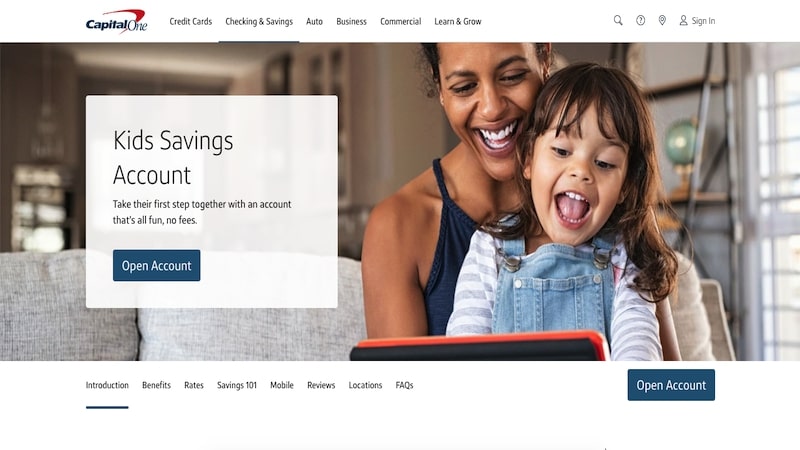
The Capital One Kids Savings Account pays a yield that’s over 3x the national average.
You won’t pay any monthly fees with this account, and there’s no minimum deposit needed to open or maintain the account.
In addition, this account is open to anyone who is under 18 years of age.
As the parent and co-owner, you can set up an automated allowance to this account. Furthermore, you can work with your child to set and reach savings goals.
You can transfer money to your child’s Capital One savings account using your Capital One account or from another bank.
Best for: Parents who want an account that allows for transfers from other banks and pays a high interest yield
Pros
- High interest rate yield
- Transfer from inside or outside of Capital One
- Available to all kids under 18
Cons
- As with all savings accounts, you are limited to six transfers per month
10. PNC Bank ‘S’ is for Savings Account
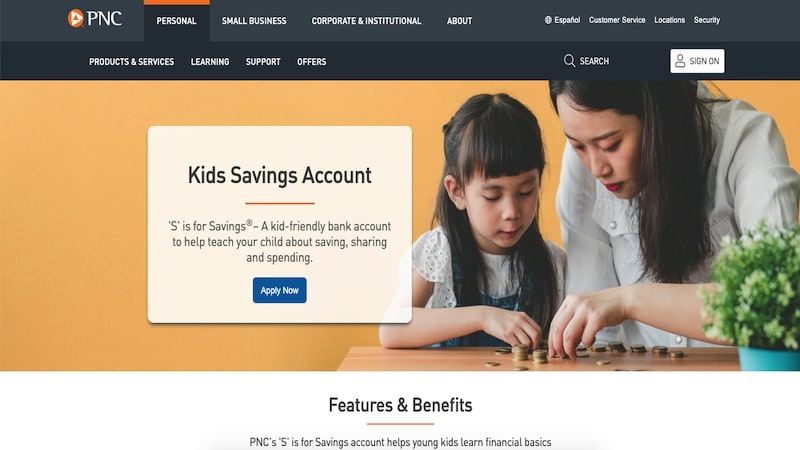
PNC Bank’s “S” is for Savings account is available to any child under the age of 18.
There is a $25 minimum opening balance requirement and minimum maintenance balance requirement.
The $5 monthly fee is waived as long as your child is under 18 years of age.
Once your child turns 18, there are other qualifications for waiving the $5 monthly fee if they want to keep the account.
Each account includes three “jars.” One is for saving, one is for spending and one is for giving. Your child can move money between the three jars as often as they’d like.
Best for: Parents who want to teach their kids the concepts of saving, spending and giving
Pros
- Fee can be easily waived
- Saving/spending/giving jars
Cons
- $25 minimum opening / maintaining balance required
Kids Bank Account Comparison Chart
FAQ
Here are the answers to some common frequently asked questions about bank accounts for kids.
Every bank or fintech that offers bank accounts for kids has different costs and fees. However, the best bank accounts for kids have no fees or make it easy to avoid extra charges.
See the Terms and Conditions page for each company for exact details on fees.
The best bank account for your child is the one that meets most or all of your needs. Different families have different needs for the bank account they want.
Read about the various features on each account you’re considering, then make your decision based on which bank or fintech best meets your needs.
Most bank accounts are safe for kids to use. The safest bank accounts are FDIC insured and have high levels of internet security.
Check out the security pages of the banks you’re considering for more details.
Summary
Banking and debit card usage is a necessity in today’s world. The best bank accounts for kids, along with your guidance, will help your kids learn to be responsible with money management.
Consider opening a bank account for your child so you can start helping them prepare for managing their money wisely.



